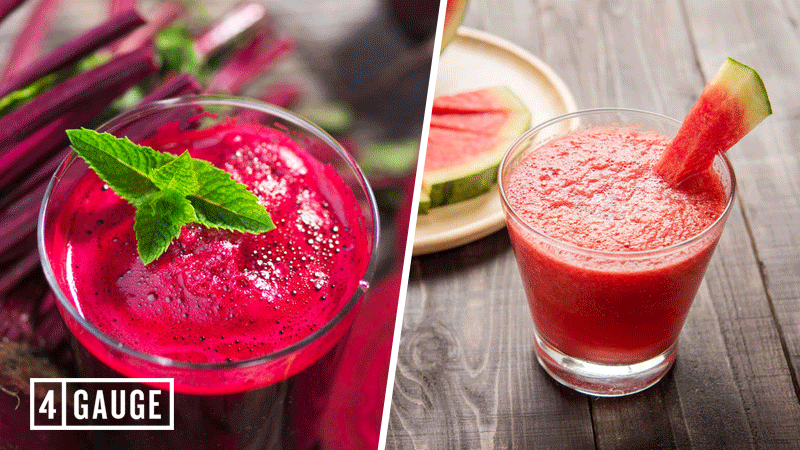Flash Sale!
Buy 3 Bottles of 4 Gauge ELITE,
Get 1 FREE + a FREE Shaker Bottle!
This store requires javascript to be enabled for some features to work correctly.

When it comes to healthy food, the clue is in the color.
That’s because the deeper and more vibrant your food, the more nutrients are packed into them.
In this article we talk about two of the most colorful, nutritious juices out there – beetroot and watermelon.
How do they boost health and exercise performance?
Let’s take a look…
There’s just something about beetroot that makes it stand out from other foods.
Whether it’s the intense, velvety purple color or the earthy, smoky taste – it’s one of the most distinctive foods out there.
Known as red beet or sometimes simply beet, beetroot is a vegetable that can be used in both savory and sweet dishes. It’s used in everything from beetroot curry to tarte tatin, and from brownies to salads and juices
Not only is beet low in calories, it is rich in vitamins and minerals.
You’ll get a decent amount of carbs and dietary fiber for very few calories, and a generous hit of vitamin A and C as well as potassium, iron and calcium.
The rich crimson-purple color comes from a phytochemical called betacyanin – a category of betalain that has potent anti-fungal properties and has been shown to reduce tumor growth in human studies.
You’ll also find carotenoids in the root too, in particular lutein and zeaxanthin which are both good for eye health.
The star of the show when it comes to exercise performance are nitrates. These are compounds that play a critical role in maintaining vascular health and blood pressure [1].
The inorganic nitrates in beet act as precursors in the body to nitric oxide (NO). It does this via a series of enzymatic reaction called the nitrate-nitrite-nitric oxide pathway.
And it’s nitric oxide that plays a major role in relaxing your blood vessels, helping blood flow and reducing excess pressure.
Your body produces it’s own nitric oxide in order to regulate vascular health. But when you supplement this with beetroot juice for example, you rapidly increase its availability – and this in turn improves health.
The nitrate pathway has been shown to have health and therapeutic benefits for a number of vascular-related diseases [2]:
Beetroot supplementation for exercise performance has become a big thing recently.
We’ve realized that because of its nutrient profile and nitrate content, the low-calorie vegetable can help you exercise more productively.
How? By reducing the oxygen cost of high-intensity exercise, and as such, helping you train for longer before you reach exhaustion.
For many years, scientists thought that the amount of oxygen you used during exercise was set by the intensity – it couldn’t be changed by nutrition.
But supplementing your diet with beetroot juice or a supplement containing beetroot extract has been shown to reduce the amount of oxygen used during exercise by 5%.
It also reduced blood pressure and increased work output from 19% to 21.1% too [3].
And in another study, beetroot juice supplementation was seen to significantly improve 1500 m run times whuch demonstrated that the juice had the potential to improve exercise endurance at higher intensities [4].

There’s nothing finer than a refreshing watermelon juice on a hot summer’s day.
It’s deliciously sweet and hydrating taste alongside its vivid pink color just screams high nutritional value.
Originating in South Africa, the watermelon is a juicy, fleshy fruit that is characterized by its deep pink flesh and black seeds.
You can eat it in slices, add it to fruit salads and you can even use it to make wine. It can also be consumed as a juice of course.
Watermelon is over 90% water and only 30 kcal per 100 g. But it still provides you with a surprising amount of nutrients.
Much like beetroot, watermelon provides a considerable amount of vitamin C as well as vitamins B6 and A.
In terms of phytochemical content, the fruit contains the antioxidant lycopene which has long been thought to [5]:
The most important nutrient for vascular health and performance in watermelon is citrulline malate – an organic amino acid found in the rind and flesh.
Studies show that when citrulline was given to a group of 41 trained men prior to intense weight lifting, muscle recovery improved significantly [6].
After performing 16 sets of chest exercises on two separate workouts, the men found that not only did their number of repetitions increase with the same weight, their muscle soreness after training decreased by a massive 40%.
In another study, citrulline was seen to improve exercise performance in a group of women during upper and lower-body strength training [7]. Not only did the volunteers lift the same weight for greater reps after taking the watermelon juice extract, they showed no signs of additional fatigue either.

4 Gauge is an exhaustively researched, all-natural pre workout designed to rip the lid off your gym sessions, sports games or workouts.
Packed with performance-enhancing nutrients such as caffeine, L-theanine and creatine, 4 Gauge will take your training to a completely new level.
